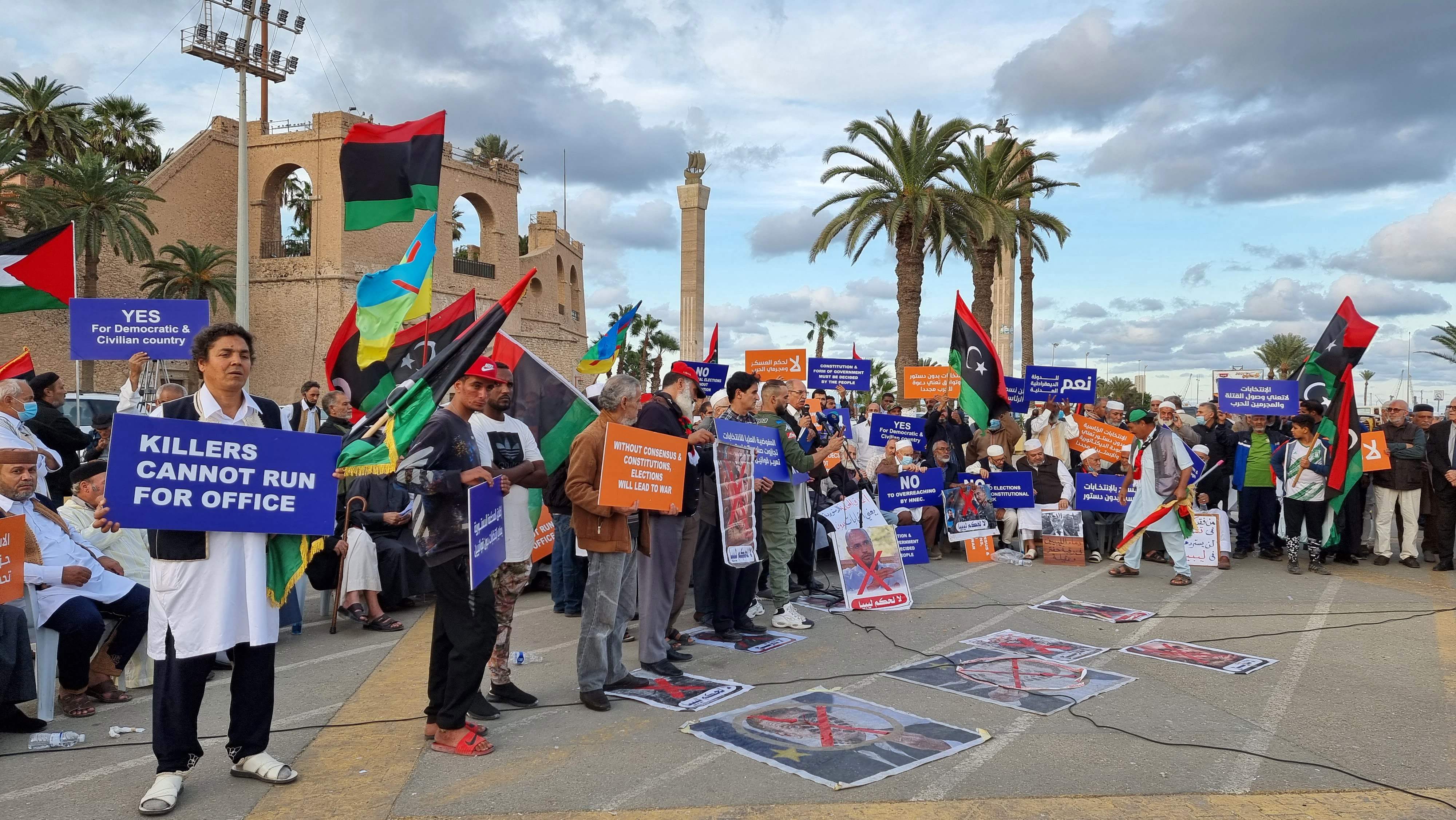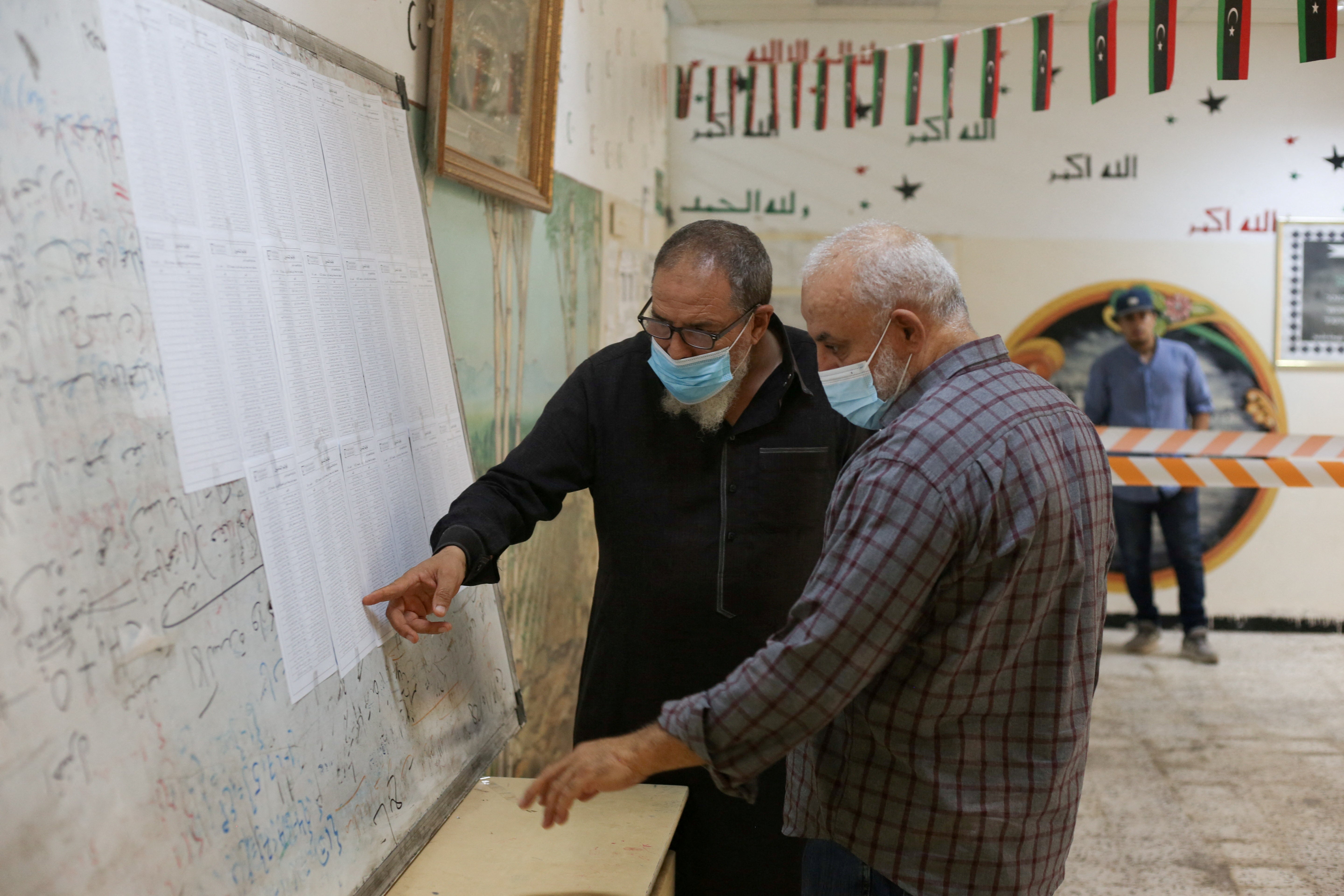‘Bordering on insanity’: Why Libya’s election could incite violence it was meant to abate
Polls are unlikely to happen next week as planned and analysts fear chaos could lead to clashes, reports Borzou Daragahi


There is only a week to go until Libya’s scheduled presidential and parliamentary elections, yet no candidates have been officially confirmed, few believe the polls will take place, and regardless of whether they happen, there is a grave threat of political violence.
The elections have long been touted as a way to restore order and unity to a nation ravaged by terrorism, divided by war and degraded by economic ruin, but the build-up has been dogged by disagreements over the vote’s legality and eligibility of some of the frontrunners.
In recent days, rival militias in the capital, Tripoli, have deployed convoys of machine-gun mounted pickups, threatening each other as well as the interim government of Abdul Hamid Dbeibah, the current prime minister and one of the main candidates for the planned vote on 24 December.
Meanwhile in the country’s vast desert in the south, forces loyal to warlord Khalifa Haftar, also a presidential contender, have been building up their forces ahead of the UN-backed vote for a parliament and the president.
Weapons shipments from foreign backers have been flooding the country, despite a UN arms embargo, and violations of a tentative truce between warring factions have escalated.
“Honestly it’s bordering on insanity,” said Anas el-Gomati, of the Libya-focused think tank, the Sadeq Institute. “We’re hours if not days away from the UN having to say the elections are going to be postponed.”
“I have seen better preparations to catch a taxi,” he told The Independent.
Those on the ground in Tripoli describe the atmosphere as volatile and tense. Many are worried that any news about the presidential and parliamentary elections, if announced abruptly, could worsen the already dangerous situation.
“Libya is sliding towards a dark place,” Libyan scholar Tarek Megrisi wrote on Twitter.
“Everyone knows the elections won’t happen next week, yet no one has officially announced it. So, everyone is manoeuvring, preparing positions, making chaos to fill the void and provide leverage for political gains.”

Some have speculated that election officials and international backers are striving to find wiggle room to maintain the tense status quo, perhaps by declaring 24 December as the symbolic beginning of the electoral process that could lead to a vote in January or February.
A member of Libya’s election commission said on Thursday that the vote would not happen as planned.
“It would not be possible to hold the elections as scheduled, as there is no time for campaigning,” Abu Bakr Marada, a member of the High National Election Commission, told Al-Jazeera.
Election officials themselves are said to be afraid – worried that officially announcing candidates and thereby triggering the formal campaigning period could make them targets of violence.
Nearly 100 candidates are vying for the presidency and nearly 5,000 for parliamentary constituencies.
“If they include some of the controversial candidates they could be on the receiving end of some movement of anger,” said Jalel Harchaoui, a North Africa specialist at the Global Initiative Against Transnational Organised Crime.
At the heart of the problem is ambiguity about what the election means. The vote is coming before the powers of the country’s next president have been clearly defined.
This election is to name the supreme commander of the armed forces
Major players, including Mr Haftar’s camp and the western Libyan militia, worry that any election for president may be the country’s last, and that the winner could cement authoritarian rule, or at least try to.
“There are legal concerns,” Mr Harchaoui said. “Some players would be able to challenge the very electoral process. The laws that are supposed to be a substitute for the constitution are very incomplete, very frail, very weak, very contradictory.”
Sparsely populated and oil-rich, Libya has been teetering in and out of war and chaos since the Nato-backed rebels overthrew the four-decade dictatorship of Muammar Gaddafi more than 10 years ago.
The UN and international powers rushed 2012 elections that set the stage for Libya’s descent into violence and fragmentation. They are now pushing for the upcoming vote.
At a summit in Paris last month, western and Middle East leaders called for next week’s vote to take place as planned. And at the G7 summit in Liverpool last weekend, the UK, the United States, Canada, France, Germany, Italy, Japan, and the European Union called for “free, fair, inclusive and elections starting on 24 December”.
The UN’s special envoy for Libya, Stephanie Williams, who was recently reappointed after the sudden resignation of her predecessor Jan Kubis, is shuttling across the country meeting with stakeholders, attempting to find some common ground and maintain the shaky peace ahead of, during and after any elections.
She called in a recent tweet for all to respect “the overwhelming demand of the Libyan people to elect their representatives through a free, fair and credible election”.

But although formal campaigning has yet to begin, glaring irregularities have already emerged. The late Gaddafi’s son, Saif al-Islam, is among the highest profile figures vying for the presidency, even though he is wanted by the International Criminal Court in The Hague.
Mr Dbeibah, who was picked to lead the fragmented country in a UN-backed process earlier this year, has been using official resources to barnstorm the nation and effectively campaign.
Mr Haftar controls the security infrastructure of the country’s east and west and will oversee the counting of ballots in an election in which he is a major candidate.
All three major candidates are facing legal challenges in Libyan courts.
In the capital, rival armed factions that united to fight off Mr Haftar’s advance on Tripoli in 2019 and 2020 have resumed their clashes, menacing each other and terrifying ordinary civilians who would be expected to emerge from their homes and vote next Friday.
Armed mercenaries allied with Turkey and Russia, each backing rival factions, continue to maintain a presence in the country.
Human Rights Watch warned last month that armed groups all over the country were intimidating, detaining and attacking journalists, activists, and human rights defenders, souring any spirit of civic discourse and engagement.
While some of the less favoured candidates have given interviews on television, few have articulated a credible and coherent vision for the country, said Mr Gomati. Among the frontrunners, the stakes are high.
“The election in Libya is not about some charming figure who engages with the nation and the world,” he said.
“None of the candidates have been able to elaborate a vision. They’re not entering into some gentlemen’s agreement with the public. This election is to name the supreme commander of the armed forces.”
Join our commenting forum
Join thought-provoking conversations, follow other Independent readers and see their replies
Comments
Bookmark popover
Removed from bookmarks